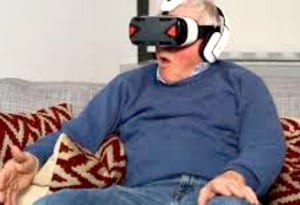
Twenty stroke patients participated in the study. The patients used a virtual reality program that gave a first-person view of the patient using his or her arms. The researchers, without informing the patients, sometimes enhanced the visual representation of the patient’s paretic limb on-screen.
Just 10 minutes of virtual enhancement of the paretic limb was enough to make stroke patients change their behavior after the study. Before the study, there was, on average, a 35 percent chance that a patient would spontaneously use his or her paretic arm to reach for something directly in front of them. Afterwards, there was a 50 percent chance that the patient would use his or her paretic arm.
Lead researcher Belen Rubio said of the findings, “This therapy could create a virtuous circle of recovery, in which positive feedback, spontaneous arm use and motor performance can reinforce each other. Engaging patients in this ongoing cycle of spontaneous arm use, training and learning could produce a remarkable impact on their recovery process.”
The findings are important because many stroke patients favor their stronger limb. A therapy that encourages patients to use and strengthen limbs affected by stroke could significantly improve the ease of daily activities.
This research is published in the Journal of NeuroEngineering and Rehabilitation.
Previous news in stroke:



 © 2026 Unyte Health US Inc.
© 2026 Unyte Health US Inc.